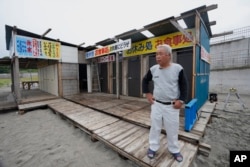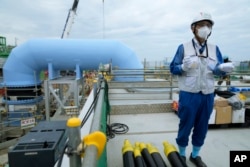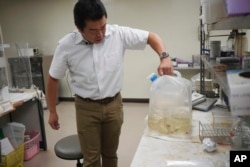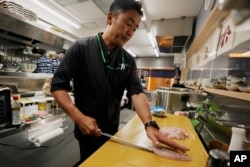IWAKI, Japan – Beach season has began throughout Japan, which implies seafood for vacation makers and good occasions for enterprise homeowners. But in Fukushima, which will finish quickly.
Within weeks, the tsunami-hit Fukushima Daiichi nuclear energy plant is predicted to start out releasing handled radioactive wastewater into the ocean, a extremely contested plan nonetheless dealing with fierce protests in and out of doors Japan.
Residents fear that the water discharge, 12 years after the nuclear catastrophe, might deal one other setback to Fukushima’s picture and harm their companies and livelihoods.
‘Without a wholesome ocean, I can’t make a residing,’ stated Yukinaga Suzuki, a 70-year-old innkeeper at Usuiso seaside in Iwaki about 50 kilometers (30 miles) south of the plant. And the federal government has but to announce when the water launch will start.
 Yukinaga Suzuki, an inn keeper, speaks at his seaside home he additionally runs on the Usuiso seaside in Iwaki, northeastern Japan, July 6, 2023.
Yukinaga Suzuki, an inn keeper, speaks at his seaside home he additionally runs on the Usuiso seaside in Iwaki, northeastern Japan, July 6, 2023.
While officers say the potential influence could be restricted to rumors, it is not but clear if will probably be damaging to the native financial system. Residents say they really feel ‘shikataganai’ – that means helpless.
Suzuki has requested officers maintain the plan no less than till the swimming season ends in mid-August.
‘If you ask me what I take into consideration the water launch, I’m towards it. But there’s nothing I can do to cease it as the federal government has one-sidedly crafted the plan and can launch it anyway,’ he stated. ‘Releasing the water simply as individuals are swimming at sea is completely out of line, even when there isn’t any hurt.’
The seaside, he stated, shall be within the path of handled water touring south on the Oyashio present from off the coast of Fukushima Daiichi. That’s the place the chilly Oyashio present meets the nice and cozy, northbound Kuroshio, making it a wealthy fishing floor.
The authorities and the plant’s operator, Tokyo Electric Power Company Holdings, or TEPCO, have struggled to handle the large quantity of contaminated water accumulating for the reason that 2011 nuclear catastrophe, and introduced plans to launch it to the ocean throughout the summer season.
 Tomohiko Mayuzumi, a spokesperson of Tokyo Electric Power Company Holdings, also referred to as TEPCO, speaks throughout a tour of the Fukushima Daiichi nuclear energy plant in Futaba city, Japan, July 14, 2023.
Tomohiko Mayuzumi, a spokesperson of Tokyo Electric Power Company Holdings, also referred to as TEPCO, speaks throughout a tour of the Fukushima Daiichi nuclear energy plant in Futaba city, Japan, July 14, 2023.
They say the plan is to deal with the water, dilute it with greater than 100 occasions the seawater after which launch it into the Pacific Ocean by means of an undersea tunnel. Doing so, they stated, is safer than nationwide and worldwide requirements require.
Suzuki is amongst those that should not totally satisfied by the federal government’s consciousness marketing campaign that critics say solely highlights security. ‘We do not know if it is protected but,’ Suzuki stated. ‘We simply cannot inform till a lot later.’
The Usuiso space used to have greater than a dozen family-run inns earlier than the catastrophe. Now, Suzuki’s half-century outdated Suzukame, which he inherited from his mother and father 30 years in the past, is the one one nonetheless in enterprise after surviving the tsunami. He heads a security committee for the world and operates its solely seaside home.
Suzuki says his inn friends will not point out the water concern in the event that they cancel their reservations and he would solely must guess. ‘I serve recent native fish to my friends, and the seaside home is for guests to relaxation and relax. The ocean is the supply of my livelihood.’
 University of Tokyo environmental chemistry professor Katsumi Shozugawa exhibits the groundwater he collected from a no-go zone simply outdoors of the Fukushima Daiichi nuclear plant advanced on July 19, 2023, in Tokyo. Shozugawa stated radioactivity of the handled water is so low that after it hits the ocean it can shortly disperse and change into virtually undetectable.
University of Tokyo environmental chemistry professor Katsumi Shozugawa exhibits the groundwater he collected from a no-go zone simply outdoors of the Fukushima Daiichi nuclear plant advanced on July 19, 2023, in Tokyo. Shozugawa stated radioactivity of the handled water is so low that after it hits the ocean it can shortly disperse and change into virtually undetectable.
The March 11, 2011, earthquake and tsunami destroyed the Fukushima Daiichi plant’s cooling programs, inflicting three reactors to soften and contaminating their cooling water, which has since leaked repeatedly. The water is collected, filtered and saved in some 1,000 tanks, which is able to attain their capability in early 2024.
The authorities and TEPCO say the water have to be eliminated to make room for the plant’s decommissioning, and to stop unintentional leaks from the tanks as a result of a lot of the water continues to be contaminated and wishes retreatment.
Katsumasa Okawa, who runs a seafood enterprise in Iwaki, says these tanks containing contaminated water hassle him greater than the handled water launch. He desires to have them eliminated as quickly as potential, particularly after seeing ‘immense’ tanks occupying a lot of the plant advanced throughout his go to a couple of years in the past.
An unintentional leak could be ‘an final strikeout. … It will trigger precise harm, not status,’ Okawa says. ‘I feel the handled water launch is unavoidable.’ It’s eerie, he provides, to must dwell close to the broken plant for many years.
 Katsumasa Okawa, proprietor of a fish retailer and a restaurant, cuts flounder meat as he prepares at his restaurant in Iwaki, northeastern Japan, July 13, 2023.
Katsumasa Okawa, proprietor of a fish retailer and a restaurant, cuts flounder meat as he prepares at his restaurant in Iwaki, northeastern Japan, July 13, 2023.
Fukushima’s badly hit fisheries group, tourism and the financial system are nonetheless recovering. The authorities has allotted 80 billion yen ($573 million) to assist still-feeble fisheries and seafood processing and fight potential status harm from the water launch.
Japanese fishing organizations strongly opposed Fukushima’s water launch, as they fear about additional harm to the status of their seafood as they battle to recuperate. Groups in South Korea and China have additionally raised considerations, turning it right into a political and diplomatic concern. Hong Kong has vowed to ban the import of aquatic merchandise from Fukushima and different Japanese prefectures if Tokyo discharges handled radioactive wastewater into the ocean.
China plans to step up import restrictions and Hong Kong eating places started switching menus to exclude Japanese seafood.
Japan sought assist from the International Atomic Energy Agency for transparency and credibility. IAEA’s closing report, launched this month and handed on to Prime Minister Fumio Kishida, concluded that the strategy meets worldwide requirements and its environmental and well being impacts could be negligible. IAEA Director General Rafael Grossi stated radioactivity within the water could be virtually undetectable and there’s no cross-border influence.
Scientists typically agree that environmental influence from the handled water could be negligible, however some name for extra consideration on dozens of low-dose radionuclides that stay within the water, saying information on their long-term impact on the atmosphere and marine life is inadequate.


